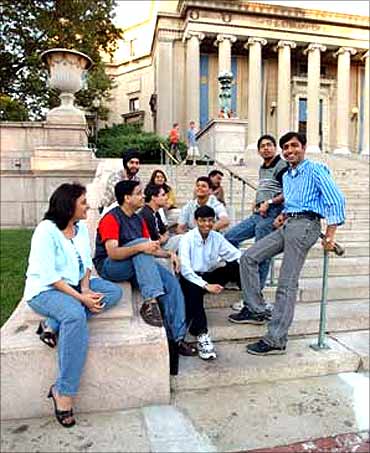
Canada offers a wealth of higher education options and life-enriching opportunities at its universities and university colleges, and has over 90 universities and university colleges that are diverse and range in size from less than 1,000 students to over 40,000 students.
They are located across the country.
There is no federal or national department of education in Canada.
Each province and territory has exclusive responsibility for elementary, secondary and post-secondary education within its borders.
Range of programmes
Universities in Canada offer undergraduate (Bachelor's and Honours) and graduate degrees (master's and doctoral).
The length of most undergraduate (Bachelor's) degrees is four years when undertaken on a full-time basis.
Bachelor of Law (LLB) programmes are usually three years in duration, but require at least three years of prior undergraduate study for admission.
Similarly, degrees in medicine are usually of four-year duration, however, admission to medical schools in Canada requires three years of prior undergraduate study.
Postgraduate degrees from Canadian universities, including Master's and doctoral degrees, are highly regarded internationally and generally offer competitive tuition fees.
University colleges also offer academically-oriented undergraduate degrees as well as more practically-oriented college degrees or diplomas.
Postgraduate programmes in Canada offer excellent value for money, and tuition fees are generally lower than most other international destinations.
Please click NEXT to continue reading...
Dear Readers, have you ever studied at an international university? What was the experience like?
Which country and university did you go to?
Was the country student-friendly? Did it have a multi-ethnic culture?
What were your greatest learnings there? How did foreign education contribute to your success and what advice would you like to share with students who aspire to study abroad?
To share your experience and advice, write in to us at studyingabroad@rediffmail.com (Subject Line: 'My Study Abroad Experience') and we will publish the best responses on rediff.com

World rankings
Canadian universities consistently appear in rankings of world-class institutions.
The Times 2010 World University Ranking placed nine Canadian universities in the Top 200.
Shanghai Jiao Tong University's prestigious 2010 Academic Ranking of World Universities placed four Canadian institutions in its top 100.
Colleges and technical institutes
These institutes offer vocationally-oriented programmes of study leading to certificates and diplomas and some degree programmes (eg Applied Arts degrees).
These institutions are very similar to TAFE (Technical And Further Education) colleges in Australia and generally tend to focus heavily on training and skills development through hands-on experience.
Some colleges offer transfer programmes that enable participants to complete courses through the college and then later transfer into a university or university college, sometimes with credit towards their university degrees.
Canadian visa procedures
As a student, the documentation you require to study in Canada may depend upon the length of time you plan to stay in the country, the province in which you will be studying and the academic institution you will attend.
Applying for a study permit
A study permit is required for programmes of six months or more. Applications should be submitted to the nearest Canadian Embassy or Consulate.
You will be asked to provide identification documents, your acceptance letter to a Canadian institution and proof of sufficient funds for your stay in Canada.
A medical exam may also be required.
Students are strongly urged to apply for their visa as soon as possible, and at least two to three months in advance of their planned departure to Canada.
Regardless of whether or not you require a study permit, ensure that you obtain a visa and carry it with your Letter of Acceptance from the Canadian institution where you plan to study.
You can get more info at https://www.educationau-incanada.ca/ or https://www.educationau-incanada.ca/

Post-graduation work programme
The post-graduation work programme is designed to provide graduating students with Canadian work experience in their fields of study for up to three years after their graduation.
The work permit cannot be valid longer than the length of time the student studied.
For example, students graduating from a four-year degree programme might be eligible for a three-year work permit.
Students graduating from an eight-month certificate programme would only be eligible for a work permit of eight months.
Working in Canada
Under certain conditions, you may be able to work in Canada.
Students who do not have a study permit are not eligible to work in Canada.
Provided you hold a study permit, you can work on the campus of any publicly funded, degree granting institution that you are attending (no separate work permit is required).
The employer can be the institution, the faculty, a student organisation, a private business or a private contractor providing services to the campus.
This provision also allows for working as a graduate, research or teaching assistant at an 'off campus site' that has a formal affiliation with the institution (Eg: Teaching hospitals, clinics or research institutes).
Some full-time students who have obtained a study permit may also be eligible to apply for an off-campus work permit that allows them to work for any employer. They can work for up to 20 hours per week during the term, and full-time during holidays. You can get more info at https://www.cic.gc.ca/english/study/work.asp
Scholarships
There are a variety of programmes and funding available to non-Canadians looking to study in Canada.
The first place to look for information is the International Scholarships website.
Whether you are in Canada for six months on an exchange or are a full fee-paying student who is embarking on an undergraduate or postgraduate degree, your time abroad is an excellent opportunity to advance your career and make valuable contacts which will help you in personal development and self-discovery.
So go ahead, hunt for the right programme.
This article is sourced from Canadian High Commission, New Delhi
Dear Readers, have you ever studied at an international university? What was the experience like?
Which country and university did you go to?
Was the country student-friendly? Did it have a multi-ethnic culture?
What were your greatest learnings there? How did foreign education contribute to your success and what advice would you like to share with students who aspire to study abroad?
To share your experience and advice, write in to us at studyingabroad@rediffmail.com (Subject Line: 'My Study Abroad Experience') and we will publish the best responses on rediff.com